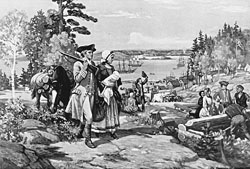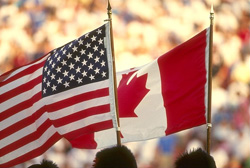|
● Historical
Background
● Structures
of Government
● The
Federal Political Scene
● Canadian
Prime Ministers
Text
Historical Background
 |
|
United Empire Loyalists
Landing at the Site of Saint John, New Brunswick, 1783.
|
 Canada's
political system reflects the two major foreign influences on the
historical development of the country: on the one hand, its legacy
as a former colony of Britain, and on the other, the powerful influence
exerted
by its neighbour to the south, the United States. Historically,
the way the Canadian government evolved is partly due to its reaction
to political development in America, where republicanism
and other revolutionary ideas were used to forge
a
nation that was supposed to correct the imperfections and corruption
of monarchic
European
society. "United
Empire Loyalists"
fled north, loyal to the idea of the British empire and hoping to
build a British North America in what would soon be known as Canada.
Their dream of a British North American which resembled
the best of Britain did not come true. Canada's
political system reflects the two major foreign influences on the
historical development of the country: on the one hand, its legacy
as a former colony of Britain, and on the other, the powerful influence
exerted
by its neighbour to the south, the United States. Historically,
the way the Canadian government evolved is partly due to its reaction
to political development in America, where republicanism
and other revolutionary ideas were used to forge
a
nation that was supposed to correct the imperfections and corruption
of monarchic
European
society. "United
Empire Loyalists"
fled north, loyal to the idea of the British empire and hoping to
build a British North America in what would soon be known as Canada.
Their dream of a British North American which resembled
the best of Britain did not come true.
 In
Britain, the central government in London wields
most political power. Canada retained
British structures, but it was impossible to recreate British conditions
in a vast, unknown, unpopulated wilderness. Over
time, strong provincial governments were persuaded to join into
the Canadian "confederation",
usually after the founding fathers in Central Canada promised to
grant new members special favours. For
example, British Columbia agreed to join confederation on the basis
that the railroad would be extended all the way to the west coast.
In the 1980s, when the federal government tried to save money by
closing down little used rail services in the west, British Columbians
fought back with the argument that their railway was protected by
the Canadian constitution. In
Britain, the central government in London wields
most political power. Canada retained
British structures, but it was impossible to recreate British conditions
in a vast, unknown, unpopulated wilderness. Over
time, strong provincial governments were persuaded to join into
the Canadian "confederation",
usually after the founding fathers in Central Canada promised to
grant new members special favours. For
example, British Columbia agreed to join confederation on the basis
that the railroad would be extended all the way to the west coast.
In the 1980s, when the federal government tried to save money by
closing down little used rail services in the west, British Columbians
fought back with the argument that their railway was protected by
the Canadian constitution.
 Provincial
governments operate on the same model as the federal government
at a lower level. Each province is led by a Premier,
who is head of the provincial house, called the legislative assembly.
Provincial governments have a great deal of power over controlling
the local economy, and education and health systems. For example,
China might be visited by trade delegations from a particular province
as well as representatives of the whole country. Provincial
governments operate on the same model as the federal government
at a lower level. Each province is led by a Premier,
who is head of the provincial house, called the legislative assembly.
Provincial governments have a great deal of power over controlling
the local economy, and education and health systems. For example,
China might be visited by trade delegations from a particular province
as well as representatives of the whole country.
 |
 American
ideas influenced the Canadian system to some degree. For example,
freedom of speech and freedom of information are much more valued
in contemporary Canada than they are in Britain, and these values
owe much to the American protection of such rights. Nowadays,
when Canadian society appears to outsiders to be so similar to American
society at first glance, it can be difficult to capture the
essence
of
what makes Canadian society feel different. The answer
can in part be found in the two slogans which define the political
aspirations
of the two countries. While
the United States was founded on the idea—Americans aspire to "life,
liberty and the pursuit
of
happiness"—Canadians chose to found a nation based on "peace,
order and good government". In other words,
for Canadians, the well-being
and liberty of individuals must sometimes be sacrificed for the
greater good of the community. American
ideas influenced the Canadian system to some degree. For example,
freedom of speech and freedom of information are much more valued
in contemporary Canada than they are in Britain, and these values
owe much to the American protection of such rights. Nowadays,
when Canadian society appears to outsiders to be so similar to American
society at first glance, it can be difficult to capture the
essence
of
what makes Canadian society feel different. The answer
can in part be found in the two slogans which define the political
aspirations
of the two countries. While
the United States was founded on the idea—Americans aspire to "life,
liberty and the pursuit
of
happiness"—Canadians chose to found a nation based on "peace,
order and good government". In other words,
for Canadians, the well-being
and liberty of individuals must sometimes be sacrificed for the
greater good of the community.
 Canadians
have settled for being a little less free than their American cousins.
For example, the right to own and use guns is considered a fairly
fundamental expression of freedom in America, even though
guns are the source of much violence. Canadians prefer to do without
this particular "freedom" because society is safer as
a whole if individuals are not allowed easy access to firearms.
Of course, some Canadians would prefer to have less government interference
in such matters, while others would like to see more. But
to date, Canadians have liked living in a society which allows
a high degree of tolerance of different values and customs as long
as the overall good of the community is not disturbed by them. Canadians
have settled for being a little less free than their American cousins.
For example, the right to own and use guns is considered a fairly
fundamental expression of freedom in America, even though
guns are the source of much violence. Canadians prefer to do without
this particular "freedom" because society is safer as
a whole if individuals are not allowed easy access to firearms.
Of course, some Canadians would prefer to have less government interference
in such matters, while others would like to see more. But
to date, Canadians have liked living in a society which allows
a high degree of tolerance of different values and customs as long
as the overall good of the community is not disturbed by them.
 Trying
to find a workable balance between community and individual rights
has been the central concern of Canadian policy-makers. This problem
is most obvious in the attempts to reconcile the two
communities of English-speaking Canada and French-speaking Canada
and most of Canadian politics is about finding a constitutional
arrangement to satisfy the demands of Quebec, the home of most of
Canada's French people, and the rest of Canada. Trying
to find a workable balance between community and individual rights
has been the central concern of Canadian policy-makers. This problem
is most obvious in the attempts to reconcile the two
communities of English-speaking Canada and French-speaking Canada
and most of Canadian politics is about finding a constitutional
arrangement to satisfy the demands of Quebec, the home of most of
Canada's French people, and the rest of Canada.
Previous Page Next
Page
|

